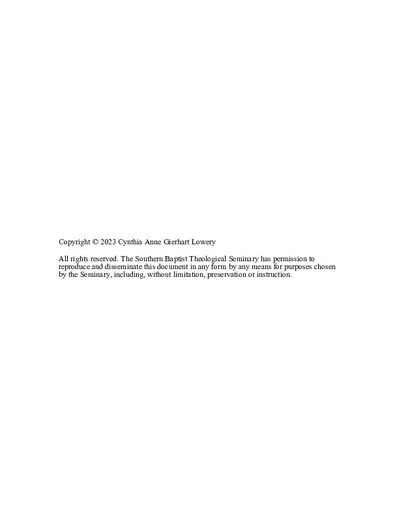The Role of Female Biblical Counselors in Complementarian Churches
Subject
Women in church workCounseling--Religious aspects--Christianity
Men--Counseling of--Religious aspects--Christianity
Abstract
In this dissertation, I argue that the role of female biblical counselors in complementarian churches is to minister to men and couples in addition to women and children, under the shepherding oversight of the elders. To defend my thesis, I exegetically evaluate gender-restrictive texts, “one-another” commands, eight additional biblical themes, and women who instructed men with Scripture’s approbation.
Chapter 1 presents the need for this research, my thesis, and a survey of existing literature at the intersection of biblical counseling and complementarianism. Chapter 2 describes complementarianism and provides my exegetical analysis of the gender-restrictive texts, particularly 1 Timothy 2:12. In this verse with continuing applicability, Paul prohibits women from teaching men in the gathered assembly and from serving as elders, thereby exercising governing authority over the church; these roles are not equal to the private ministry of the Word. Chapter 3 sets forth descriptions of biblical counseling and argues that biblical counseling is the coalescence of the “one-another” commands given without gender restriction. Chapter 4 explores the relevance of the biblical themes of interdependence, gender complementarity, the authority exclusively reserved to elders, spiritual abuse, family relationship in the body of Christ, wisdom as learned skill, spiritual gifts, and Christian liberty. Chapter 5 considers the positive way Scripture presents Deborah, Huldah, Abigail, and Priscilla instructing men in how to honor the Lord. Chapter 6 summarizes my conclusions, incorporates insight to help churches begin to develop the role of female counselors, and offers suggestions for additional research.

